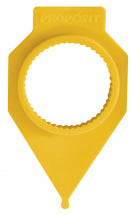Which Wheel Safety Device?
Wheel Safety – Indicators or Nut Locking Devices
What is the best way to ensure wheel safety? An important question and one which fleet engineers have been talking about for many years now. Keeping the wheels on a commercial or passenger carrying vehicle is so obviously essential and the consequences of wheel loss can be devastating and far-reaching. Detached wheels have caused serious and indeed fatal injuries even in recent months so the problem is by no means solved.
The key elements to avoiding wheel loss include good maintenance procedures, workshop discipline, driver vigilance and continual use of correct and defect-free components – wheels, hubs, axles, brakes, studs and nuts. Manage all of these efficiently, all the time, every time, for every vehicle, in all weathers, each time a wheel is removed and re-fitted and you should have no problem.
But even that’s no guarantee. From case-studies we have followed as part of our experience in supplying wheel safety products, circumstances can conspire against the best planned maintenance regimes resulting in insecure or even detached wheels. Thankfully, these incidents are rare but who is prepared to ignore the possibility?
In its classic booklet Wheel Loss – No longer a mystery, The Society of Operations Engineers (SOE) addressed the problem and presented valuable wheel safety advice. However, it indicated that ’Wheels are still coming off despite an understanding of the mechanisms and good maintenance procedures.’ The SOE has since published an updated booklet - 'Wheel Security - A best practice guide' which is an excellent source of information on this subject.
Solution 1 – Indicators
 |
Propoint Wheel Nut Indicator |
 |
Procap Wheel Nut Indicator |
Brilliant - problem solved! Well, not quite.
Why not? Because an indicator device indicates that a nut has moved – but only if someone is looking. These products are powerless to prevent nuts coming undone or wheel detachment. Moreover, even after a satisfactory visual check, wheel nuts have been known to lose clamping force during the course of a single journey resulting in a lost wheel.
Solution 2 – Nut Locking Devices
A number of devices are now available which secure two adjacent wheel nuts such that if one becomes loose, the tension through the device linking it to its neighbour will prevent loosening. These devices include products such as Ric-clip, Checklink, Checklock, Zafety Lug Lock and Prolock.
The advantage of these over indicators is that should the driver fail to visually check the wheel, in the event of loss of clamping force the locking device will or should allow travel while keeping the wheel in place. Ultimately, if unchecked, the forces acting on the wheel will cause damage to nuts, studs and the whole wheel/hub assembly but these, although costly to repair, are nowhere so traumatic as a complete detachment of the wheel and all the associated costs, inconvenience and possible investigation.
The only disadvantage, especially with the most effective of these devices, is that their very function could mask the fact that a loose nut exists.
Combination and Other Devices
This is not an exhaustive study and other products have been offered to the market with pros and cons pertaining to each. Some are complex to fit and maintain, others are costly while others again have failed to live up to their promise.
Parma Recommendations
Most devices have varying degrees of effectiveness and in deciding which to use, the engineer should consider the needs specific to the operation including frequency of checks, temperature range and evidence of test results.
For the ultimate in locking ability, we would suggest the Prolock wheel nut clamp; a product which has been well proven over 25 years and to our knowledge, no wheel fitted with these correctly has ever become completely detached.
However, for all-round effectiveness and overall cost benefits, the almost indestructible Zafety Lug Lock has become a firm favourite – easy to fit and remove, simple and hassle-free, reusable and having an outstanding temperature range.
Some large and highly experienced operators have begun using a combination of indicators and nut locking devices in a way that covers all eventualities. We think this approach comes nearest to a ‘solution’ and we would be happy to discuss how this can be implemented.
Read more blogs. Return to Blog Index Page.
